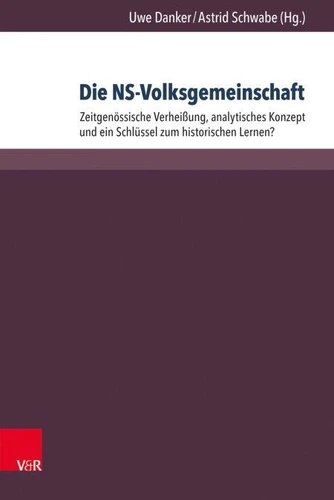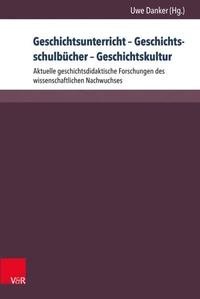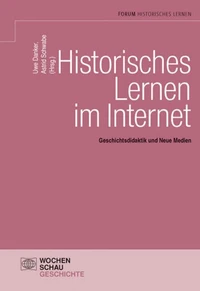Die NS - Volksgemeinschaft. Zeitgenössische Verheißung, analytisches Konzept und ein Schlüssel zum historischen Lernen?
Par : , , ,Formats :
Disponible dans votre compte client Decitre ou Furet du Nord dès validation de votre commande. Le format PDF est :
- Compatible avec une lecture sur My Vivlio (smartphone, tablette, ordinateur)
- Compatible avec une lecture sur liseuses Vivlio
- Pour les liseuses autres que Vivlio, vous devez utiliser le logiciel Adobe Digital Edition. Non compatible avec la lecture sur les liseuses Kindle, Remarkable et Sony
 , qui est-ce ?
, qui est-ce ?Notre partenaire de plateforme de lecture numérique où vous retrouverez l'ensemble de vos ebooks gratuitement
Pour en savoir plus sur nos ebooks, consultez notre aide en ligne ici
- Nombre de pages224
- FormatPDF
- ISBN978-3-8470-0544-5
- EAN9783847005445
- Date de parution15/05/2017
- Protection num.pas de protection
- Taille3 Mo
- Infos supplémentairespdf
- ÉditeurV&R Unipress
Résumé
In den vergangenen Jahren hat sich in der Geschichtswissenschaft eine produktive Debatte um den Begriff der NS-Volksgemeinschaft entfaltet. Obwohl nicht unstrittig, erweitert er das analytische Repertoire für das Verstehen und Erklären des Nationalsozialismus und kann als kanonisiert gelten. Bisher nicht diskutiert wurde der fachdidaktische Gehalt dieses Konzepts. Der vorliegende Band vereint Beiträge aus Fachwissenschaft und Geschichtsdidaktik.
In den Fokus rücken didaktische Potenziale des Konzepts und seiner Umsetzung in der schulischen sowie außerschulischen Vermittlung der Geschichte von Nationalsozialismus und Holocaust. Herausforderungen und Gefahren einer intensiveren Beachtung der >verheißungsvollen< Seiten der NS-Herrschaft im Kontext historischen Lernens werden dabei nicht außer Acht gelassen. The concept of "Volksgemeinschaft" has been the centre of productive debates among historians in recent years.
Although not completely unchallenged, the concept is now widely accepted among scholars for offering new approaches for explaining and understanding National Socialism. So far untouched by the discussions is the question of what the concept of "Volksgemeinschaft" can contribute to teaching the Nazi past. This book combines historiographical and didactical articles, examining the potentials of "Volksgemeinschaft" as an analytical tool for teaching the history of the Nazi era and the Holocaust.
The authors pay special attention to the ethical problems and challenges that arise in (non-academic) teaching and learning when focussing on the promises of Nazi ideology.
In den Fokus rücken didaktische Potenziale des Konzepts und seiner Umsetzung in der schulischen sowie außerschulischen Vermittlung der Geschichte von Nationalsozialismus und Holocaust. Herausforderungen und Gefahren einer intensiveren Beachtung der >verheißungsvollen< Seiten der NS-Herrschaft im Kontext historischen Lernens werden dabei nicht außer Acht gelassen. The concept of "Volksgemeinschaft" has been the centre of productive debates among historians in recent years.
Although not completely unchallenged, the concept is now widely accepted among scholars for offering new approaches for explaining and understanding National Socialism. So far untouched by the discussions is the question of what the concept of "Volksgemeinschaft" can contribute to teaching the Nazi past. This book combines historiographical and didactical articles, examining the potentials of "Volksgemeinschaft" as an analytical tool for teaching the history of the Nazi era and the Holocaust.
The authors pay special attention to the ethical problems and challenges that arise in (non-academic) teaching and learning when focussing on the promises of Nazi ideology.
In den vergangenen Jahren hat sich in der Geschichtswissenschaft eine produktive Debatte um den Begriff der NS-Volksgemeinschaft entfaltet. Obwohl nicht unstrittig, erweitert er das analytische Repertoire für das Verstehen und Erklären des Nationalsozialismus und kann als kanonisiert gelten. Bisher nicht diskutiert wurde der fachdidaktische Gehalt dieses Konzepts. Der vorliegende Band vereint Beiträge aus Fachwissenschaft und Geschichtsdidaktik.
In den Fokus rücken didaktische Potenziale des Konzepts und seiner Umsetzung in der schulischen sowie außerschulischen Vermittlung der Geschichte von Nationalsozialismus und Holocaust. Herausforderungen und Gefahren einer intensiveren Beachtung der >verheißungsvollen< Seiten der NS-Herrschaft im Kontext historischen Lernens werden dabei nicht außer Acht gelassen. The concept of "Volksgemeinschaft" has been the centre of productive debates among historians in recent years.
Although not completely unchallenged, the concept is now widely accepted among scholars for offering new approaches for explaining and understanding National Socialism. So far untouched by the discussions is the question of what the concept of "Volksgemeinschaft" can contribute to teaching the Nazi past. This book combines historiographical and didactical articles, examining the potentials of "Volksgemeinschaft" as an analytical tool for teaching the history of the Nazi era and the Holocaust.
The authors pay special attention to the ethical problems and challenges that arise in (non-academic) teaching and learning when focussing on the promises of Nazi ideology.
In den Fokus rücken didaktische Potenziale des Konzepts und seiner Umsetzung in der schulischen sowie außerschulischen Vermittlung der Geschichte von Nationalsozialismus und Holocaust. Herausforderungen und Gefahren einer intensiveren Beachtung der >verheißungsvollen< Seiten der NS-Herrschaft im Kontext historischen Lernens werden dabei nicht außer Acht gelassen. The concept of "Volksgemeinschaft" has been the centre of productive debates among historians in recent years.
Although not completely unchallenged, the concept is now widely accepted among scholars for offering new approaches for explaining and understanding National Socialism. So far untouched by the discussions is the question of what the concept of "Volksgemeinschaft" can contribute to teaching the Nazi past. This book combines historiographical and didactical articles, examining the potentials of "Volksgemeinschaft" as an analytical tool for teaching the history of the Nazi era and the Holocaust.
The authors pay special attention to the ethical problems and challenges that arise in (non-academic) teaching and learning when focussing on the promises of Nazi ideology.






